#Army Welfare Trust
Explore tagged Tumblr posts
Text
A Disturbed State Of The Natural Environment, Gods-Fucking-Dammit
A Pada-Wan Story

for @lttrsfrmlnrrgby
“Obi— Commander Kenobi-“
“You can call me Obi-Wan, Cody,” the kid huffs. “Neither you nor I will suddenly combust into a ball of fire if you do.”
You don’t know that, Cody thinks, not liking how his voice sounds in his mind.
Four days since the incident - or, “The Incident,” how Boil and Waxer like to say in unison with the bucket lights under their chins -, two since the 104th of all Battalions received their signal and towed the 212th fleet to the nearest station within the Republic that would allow them to overhaul the ships’ electronics.
It has been exactly two point five hours since Wolffe stopped wheezing at Cody over comms. Nearly as much time as the kid had vanished from under Cody’s paranoid nose.
“Councilor Kenobi is safe and sound,” General Koon had assured him while Wolffe stood at perfect parade rest a step behind, shriek-laughing his armor off.
The kid sighs. “You have come here for a reason?” he asks, stubborn and prim. “Or is Wooley babysitting me not enough?” He points a thumb over his shoulder to Wooley popping up several yards away, waving.
“If you haven’t noticed Hook, Line, and Sinker also keeping an eye on you, my trepidations are justified.”
The kid rolls his eyes, gesturing to three empty looking spots in the distance. “I am well aware Master Koon is in league with you.”
Cody will not explain safety precautions again. He’s saving that for when the kid really sets out to stomp on any and all walls Cody had to hastily and thoroughly built when his General, his partner, suddenly turned into a child at the worst possible development stage for Cody’s sanity.
The kid studies him while Cody is trying to come up with a legitimate reason for looking for him. Direct admittance to personal concern would backfire on Cody in multiple, entertaining ways, and he frankly doesn’t want to deal with that. From the kid being smug that Cody cares about him very much so keeping his distance must mean something more. To accusations of not trusting Obi-Wan (which, correct, Cody doesn’t know him after all), seeing him as a kid (also true) when he’s sixteen and basically a stone’s throw away from becoming a geezer.
Sixteen. Cody shudders. He remembers very well that half year when he was that developmental age. He shudders again. Gods, the mood swings alone.
“I am reasonably paranoid about your welfare,” he says at last. Wooden which makes him cringe but he’s never lied to Obi-Wan and he’s not starting now.
The kid stares at him for a while. One corner of his mouth quirks up with a shrug and a shuttered look in his eyes Cody desperately wants to make better. “It’s different when they really are out to get you, isn’t it.” The Council had explained how precarious his older self’s safety was at the best of times. Cody had only seen the aftermath and the accompanying ranting about life choices with the occasional visibly happy understanding that Obi-Wan could, actually, grow a non-patchy beard when he’s got a few more years on him.
“May I sit with you?” Cody asks. Shoveling his own metaphorical grave is so much easier with mixed signals after all. But he misses the older Obi-Wan. It’s not fair of him but he needs this.
The expected blush blooms on freckled cheeks. “Yes, of course!” is the eager reply, followed by more blushing.
It’s endearingly cute and Cody would like to chew on his bucket now.
The kid scoots over, wide eyed and expectant.
Gingerly, Cody lowers himself, ignoring the armor digging into his ass and thighs. And lets the silence stretch.
This, really, is what he came here for. A self-indulgent little break to catch his breath. The High General of a Systems Army is compromised and that fact has to remain eyes only to an exclusive handful of people. Only the Jedi Council knows out of obvious necessity. So it’s up to Cody to keep everything else running, keeping the admiralty in the dark because even teenaged Obi-Wan had said he’s got a bad feeling if they were to tell the brass. So they haven’t.
Usually, when flimsiwork and war horrors keep stacking up and expand into an avalanche, Obi-Wan and Cody sit together in silence, sharing a precious cup of real tea, being together and lending support and strength they can’t find for themselves but can always, always find for each other.
Selfishly he wants that strength from Obi-Wan now, the warmth of his body nearby. He’s already breathing easier.
The kid is looking at him curiously, but Cody chooses not to say anything. Instead he turns forward once more, watching the busy night markets of the station and the stars behind it. After a moment the kid does the same.
Shoulders slowly relax and the silence becomes comfortable.
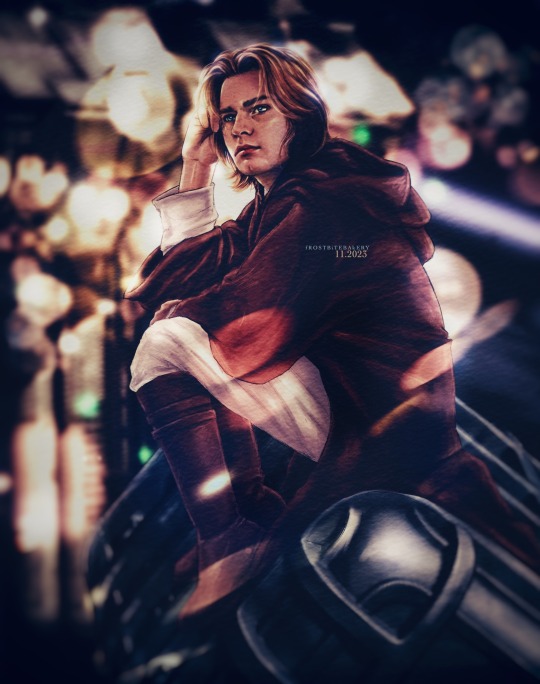
#obi wan kenobi#commander cody#codywan#star wars#star wars fanart#frostbitebakery art#padawan obi wan#what are you going to do when Jedi robes are too big#you go to a storage closet and cry#poor cody#ahhh it’s been so long since I promised to draw this!#de aged!obi wan
873 notes
·
View notes
Text

Meet General Amargo, a high ranking fairy, the supreme leader of the fairy warriors and bodyguard of Queen Láctea.
Amargo and his army of warriors are extremely loyal to the queen and the welfare of all fairies. He follows the queen as if he was her own shadow, taking care of absolutely everything knowing that his Queen is too kind for her own good.
Although the fairies are beings whose purpose is always to help other creatures, Amargo does not entirely trust them , considering them to be creatures sick with pride and undeserving of the fairies' goodwill.
.
.
.
.
.
.
.
.

186 notes
·
View notes
Text
Warhammer Gaslamp: Introduction
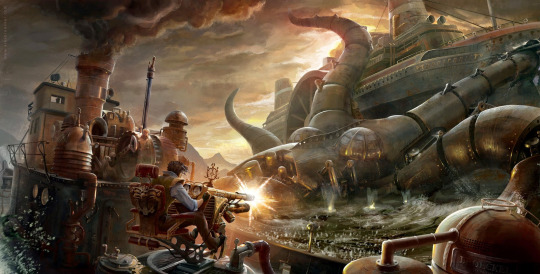
The year is 2725 IC...some two hundred years since the Age of Crisis. The time of Karl Franz I, the "Fourth Deliverer of the Empire," has long past, as has the age of knights and dragons – throughout the Old World, magic itself is a dying art.
The Empire of Man is stronger than ever before, but it is an Empire that runs on coal and iron, held together with roads of steel track, and powered by boiling, thumping hearts that pump steam and gas through the veins of the mightiest industrial power in the world. The forests remain, but they have dwindled in size, cut down to feed the endless hunger of the great metropolises, the mighty smokestacks of Nuln, Talabheim, New Averheim, and greatest of all, the bright gaslights of mighty Altdorf ("The Big Turnip"), and a hundred smaller cities that light the night skies.
The Neüscience of the Imperial Technomancers has increased national prosperity a hundredfold, improved the health and well-being of the common citizens, and helped the Imperial Army, Navy, and Airkorps put the endless hordes of Khaos on the backfoot for generations. In spite of (or because of?) this, Imperial society has become increasingly divided between the elite who profit from the new economy of high finance and heavy industry, and those millions of unskilled and semi-skilled laborers whose endless toil keeps them only ever one step ahead of the breadline and the bailiff. Meanwhile, the mounting toll of industrial pollution, epidemic disease, industrial accidents, and Neüscientific “experiments” running amok raises new questions about the high cost of success.
Politics has become ever more fractious. The Imperial Parliament is divided between the House of the People, where the Farmer-Artisan Party (representing a coalition of the Craft Guilds and their fellow urban workers, and a significant minority of rural laborers and small farmers) holds the plurality, and the House of the Nobles, where the Liberal-Conservative Party (representing both the traditional landed aristocracy and the new monied elite) holds power, and the two clash fiercely over labor rights, taxation, industrial regulation, and social welfare. Holding the uneasy balance of power is Emperor Karl-Franz XIV, his "Iron" Chancellor Ludwig von Ostermark, and their smaller Patriotic Party (largely supported by veterans and members of the civil service), who try to maintain Imperial unity and industrial production in the face of the "Threat from the Black North."
In the streets and on the shop-floors, the captains of industry known as the Great Monopolhauses (allied and often intermarried with the nobility) deploy their legions of spies and private soldiers against the rising strength of the Laborer’s Guild, who are mobilizing in the factories by the hundreds of thousands, and the industrial spies and gunthugs are kept in check only by the still-potent might of the Craft Guilds who fear and resent their industrial upstart rivals but trust the bosses even less.
The religion that once united an Empire today divides it, as Orthodox Volkmarites and Radical Hussites split over matters of class and faith. Although the two factions are still nominally part of the same Sigmarite religion, and the Church of Sigmar is held together by the firm hand of the Emperor, the two factions compete fiercely over theology and dogma, and positions within the Church unto the Grand Theogonacy itself. To the north, the philosophy professor-turned-street preacher Nietzsche von Zarathustein has single-handedly revived the fortunes of the Cult of Ulric with his fiery doctrine of Neo-Ulricism and his best-seller Man unt Wulf-Man. From the great industrial heartland of the south, the radical scholar Mark Karhl preaches the overthrow of the status quo as an inherently exploitative regime, and his pamphlet The Scarlet Platform and his massive three-volume treatise on political economy, Der Gelden (which almost no one has completed), inspire many young radical students and workers to join the revolutionary Scarlet Party and the ranks of the Laborer’s Guild. Are rumors of his secret allegiance to a Tzeenchite secret society true, or mere bourgeois propaganda?
Exacerbating these divisions is the constant threat from Khaos. Up in the "Black North" and their allied territories on the great steppes on the other side of the pole, the forces of evil pervert the laws of science to their mad push for world domination. Khornate breeder-lords select from an unceasing flow of gladiators to produce the perfect warriors; Nurglite bio-priests carefully engineer the next insidious plague to slip past the Imperial Plasmic Survey; Slaaneshi sin-merchants mobilize a world-wide network of Cathayan black tar and warpdust powder (bartered from the Skaven) to corrupt the Empire from within; and Tzeenchite techno-mancers design ever more fiendish mutated F.R.E.A.K.S and the twisted Biomechs.
Inside the Empire, things are scarcely better. Even with the darkness of the forests pushed back to the periphery and the Greenskin hordes banished to the far side of the World's Edge Mountains, the threat of Were-beastmanism and other, more insidious, forces winds its way into every neighborhood in the Empire despite the best efforts of the Imperial Plasmic Survey and the Schwarzmänner. Mutants who cannot conceal their true nature – known as the "Untervolk" - have decamped into the subway tunnels and sewers that form the Undercities of the Empire, waging an unceasing war for survival against “norms” and “ratfolk” alike. From the back alleyways and the salons of the nobility alike, the endless secret societies of Khaos vie to do their masters' bidding, undermining the Empire from within in preparation for the coming war.
It is a time that desperately needs heroes, men and women willing to brave the darkness on the mean streets and the shell-torn battlefields of the Old World alike. Mystery and intrigue, adventure and mad science await!
59 notes
·
View notes
Text
Some quotes from What Soldiers Do that are not really worth their own post or that I didn't want to give their own post, but that I want to preserve for posterity/my own reference. CW for discussion of rape.
"Knowing that the GIs were souvenir hunters, the Nazis also left behind military paraphernalia rigged with explosives. When Raymond Avignon picked up a German helmet, an American soldier saved his life by making him put it down, showing him an iron thread that would trigger an explosion, then removing it with 'meticulous' care." (26)
"According to [British spy Roxanne] Pitt, on one occasion, a British airman too shy to act as a client [while hiding out at a brothel] chose instead to dress as a prostitute; the plan backfired when a French customer took a liking to him." (137) [Cites Pitt, The Courage of Fear (1957), 75-76.] Alan Bérubé are you seeing this.
"GI Robert Peters remembers how when an an older GI named Wisher got caught in a pup tent engaged in fellatio with a platoon sergeant, the commanding officer said this to his men: 'You know the penalty for putting another man's cock in your mouth? You rot in prison for life. You'll get f--ed good there." (175) [Cites Robert Peters, For You, Lili Marlene (1995), 60.] Bérubé!!
"The [US] military insisted on keeping French sexual labor invisible, not only from War Department officials, but also and even more importantly, from the American public back home. In a May 1945 memo to all commanding officers, Adj. Gen. R. B. Lovett argued that if the army was found guilty of condoning prostitution in overseas theaters, the War Department would 'be open to the charge that it is supporting conditions inimical to the health and welfare of troops. The eventual result might be public scandal with the families of military personnel charging the War Department with an unforgivable violation of trust in neglecting to care for the physical and moral well-being of its personnel.'" (186) To go along with--
"The American GI did not have to worry that his VD would go untreated, nor that his loved ones might witness 'scenes contrary to decency.' The military approach to venereal disease in Le Havre registered a growing confidence on the part of the US government to construct--whether consciously or through inaction--asymmetries of power in the transatlantic alliance: whose health was important and whose was not, whose family would be protected and whose would not." (190)
"In general, rape was probably the most widespread war crime in the European theater of war, although its violence had different meanings in various areas. On the eastern front, the German Wehrmacht committed rape with impunity as part of their aim to enslave Slavic peoples. Beginning in Hungary in 1944, the Soviet military used rape as an instrument of revenge. At the end of the war, thousands of women suffered from the crime of rape, and not only from the Red Army. According to US Judge Advocate General (JAG) statistics, at least five hundred German women were raped by American soldiers." (197-198)
"French officers frowned upon using white prostitutes for non-white troops because, in one officer's words, 'to sexually posses a white woman, a fortiori paying her like a vulgar piece of merchandise, permits [a man of color] to reverse the power relation and re-write history in his own way.' This officer's fear that sex between a black man and a white woman could erode imperial authority suggests just how vital sex was to the maintenance of white supremacy." (249) Brackets are Roberts's. The "re-write history" phrasing was enormously striking to me.
#need to de-sticky tab this library book so i can return it#is essentially the motivation here.#wwii book club
18 notes
·
View notes
Text
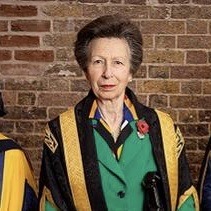
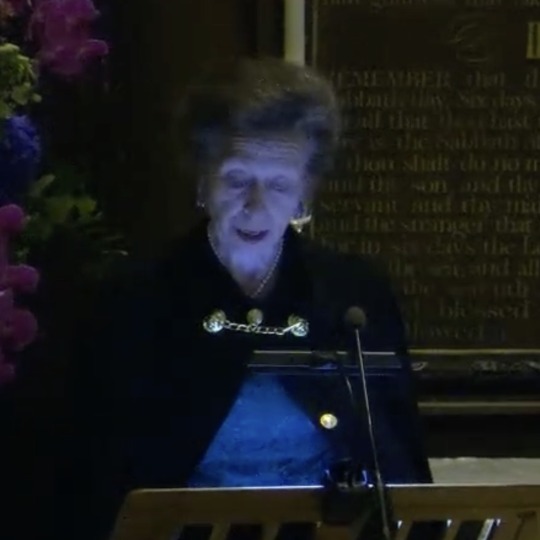
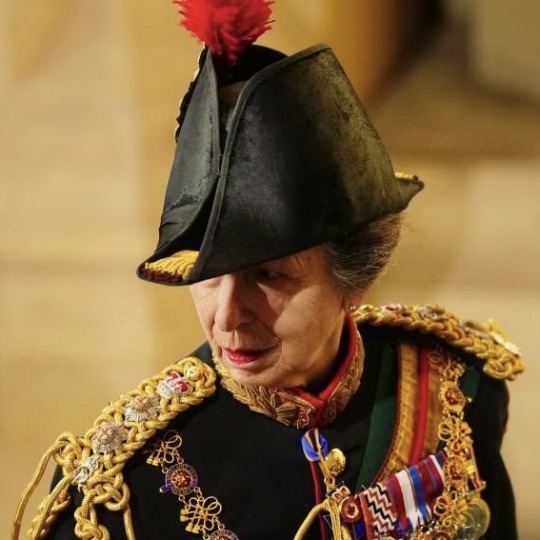
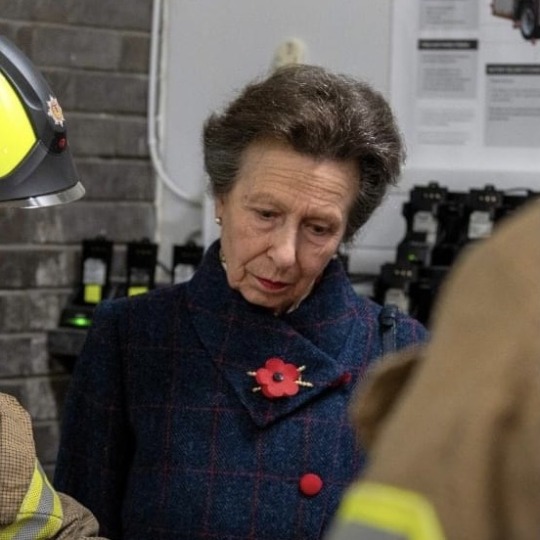
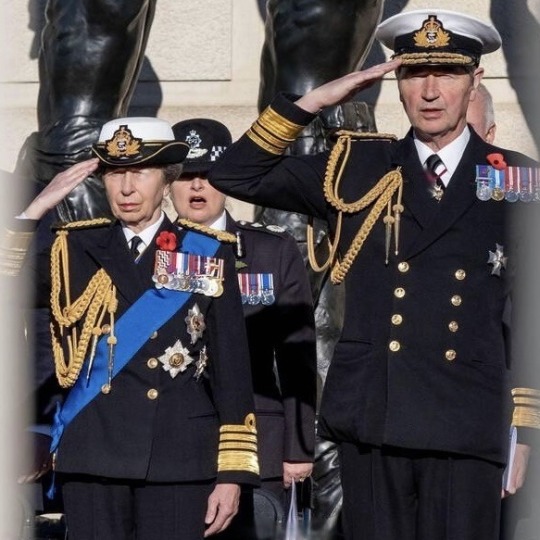
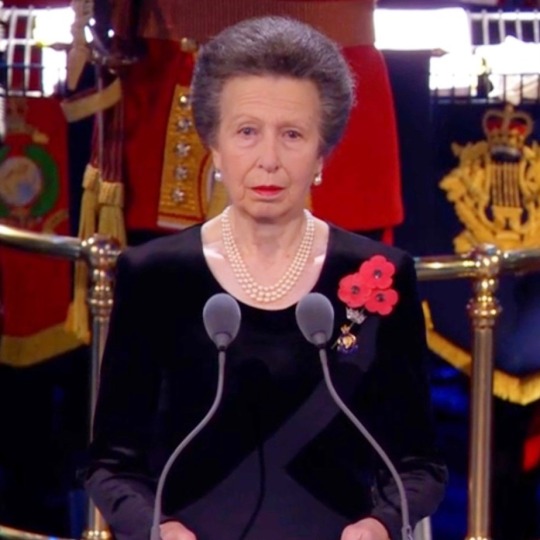
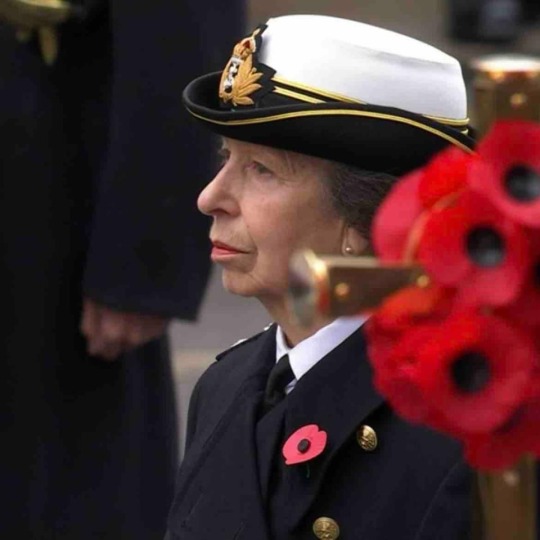

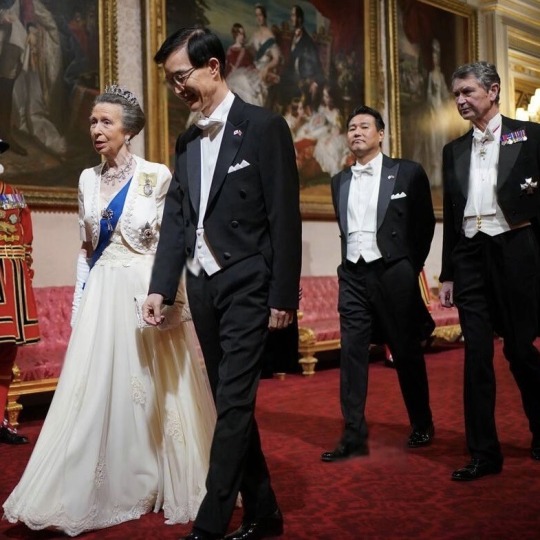
The Princess Royal’s Official Engagements in November 2023
01/11 Princess Anne, the Duke of Edinburgh and the Duke & Duchess of Gloucester attended the Senior Serving and Retired Officers’ Briefing at the Army and Navy Club on Pall Mall in London. 🪖💼
As Chancellor of Harper Adams University, attended the launch of the University’s Strategic Plan at London Bridge Arches. 🎓
With Sir Tim As Royal Bencher of the Honourable Society of the Inner Temple, attended the Grand Day Choral Evensong Service at Temple Church in London. 🎶
With Sir Tim As Liveryman of the Worshipful Company of Engineers, attended a Dinner to mark their 40th Anniversary at Mansion House in London. ⚙️
02/11 Held two investiture ceremonies at Buckingham Palace. 🎖️
03/11 As Patron of the National Association of Citizens Advice Bureaux, visited Citizens Advice Malvern Hills in Malvern, Worcestershire. 👩⚖️
Opened the Specialist Operations Centre at the Gloucestershire Constabulary and Office of Police and Crime Commissioner in Cheltenham. 👮♀️
07/11 Alongside King Charles & Queen Camilla, Princess Anne in her role as Gold Stick in Waiting, was present at the State Opening of Parliament. 👩⚖️🪶
Opened the Scottish Fire and Rescue Service Museum of Scottish Fire Heritage and the McDonald Road Community Fire and Ambulance Station in Edinburgh. 👨🚒
The Princess Royal, As Patron of the Eric Liddell 100, attended the inaugural Lecture and Reception on board Fingal, Alexandra Dock, in Edinburgh. 🏃🏽🥂
Unofficial Sir Tim attended the memorial service for former university friend and newsreader George Alagiah at St-Martin-in-the-Fields church in London 🎓🕊️
08/11 As Honorary Fellow of the Royal Society of Edinburgh, presented Royal Medals and attended a Reception at the Royal Society of Edinburgh. 🏅
As Patron of Catch22, attended the National Leaving Care Benchmarking Forum in Birmingham ✍️
As Patron of the Wooden Spoon Society, attended a Reception at the House of Lords in London. 🥄🏉🥂
As Court Member of the Fishmongers’ Company, attended a Livery Dinner at Fishmongers’ Hall in London. 🐟🍽️
09/11 As President of World Horse Welfare, attended the Annual Conference at the Royal Geographical Society. 🐴
As Patron of the Butler Trust, visited HM Prison Wandsworth in London. 🚓👮♂️
As Patron of the Whitley Fund for Nature, held a 30th Anniversary Dinner at St James's Palace. 🦋🍃
10/11 The Princess Royal, As President of Royal Yachting Association, chaired the Annual General Meeting and presented Awards before attending a Luncheon in London SW1. 🛥️
Unofficial Announcement that Princess Anne will take over Presidency of the Commonwealth War Graves Commission, taking over from the Duke of Kent who Presided over the Commission since 1970 🌹🪦
~ Remembrance weekend ~
11/11 With Sir Tim Attended the Armistice Day Service of Remembrance at the National Memorial Arboretum. 🌳 🫡
With Sir Tim Attended the Royal British Legion Festival of Remembrance at the Royal Albert Hall with members of the royal family. 🌹
12/11 With Sir Tim Attended the National Service of Remembrance at the Cenotaph in London. Princess Anne laid a wreath whilst Sir Tim stood on the Foreign & Commonwealth Office balcony. 🌹
With Sir Tim Took the salute at the March Past of Ex-Servicemen and Civilian Organisations on Horse Guards Parade, London SWI. 🫡
~ End ~
14/11 As Patron of the Chartered Institute of Logistics and Transport (UK), attended the 10th Anniversary Transport and Logistics Safety Forum Conference at the National Memorial Arboretum. 🚚
Visited the new Institute of Shipbuilding course at City of Glasgow College Riverside Campus in Glasgow. ⚓️
As Patron of the Royal Celtic Society, attended a Reception at Glasgow City Chambers. 🏴
Attended Interfaith Glasgow’s Scottish Interfaith Week Forum at Glasgow City Chambers. ☪️✡️✝️���️🪯
Unofficial Sir Tim attended a Kent Cricket celebration dinner at Lords Cricket Ground 🏏
15/11 Visited BAE Systems Submarines' Submarine Academy and the University of Cumbria. 🤿 👨🎓
Visited the Nuclear Decommissioning Authority in Barrow-in-Furness. ☢️
As Patron of the National Association of Citizens Advice Bureaux, visited the Barrow-in-Furness branch to mark its reopening. 🤝
As Patron of the Liverpool School of Tropical Medicine, attended a Dinner at St George's Hall, to mark its 125th anniversary. 🦜💊
16/11 As Vice Patron of the British Horse Society, attended a Coaching Career Insight Day.
As Patron of the Butler Trust, visited HM Prison Drake Hall.
As Patron of Transaid, attended a Reception at London Transport Museum.
17/11 Not Counted Departed Heathrow Airport for Gibraltar but was diverted to Madrid, Spain and arrived in Gibraltar later than intended. ✈️🇪🇸🇬🇮
With Sir Tim As Royal Patron of the Gibraltar International Literary Festival, attended the Literary Festival Opening Dinner at the Sunborn Hotel. 📚🍽️
18/11 In Gibraltar Princess Anne;
As Patron of the National Association of Citizens Advice Bureaux, visited Gibraltar Citizens Advice Bureau to mark its 20th anniversary. 👩⚖️
Opened the renovated premises of the Royal Gibraltar Regiment Association. 🫡
Met representatives of the Emergency Services and members of the Armed Forces at the Convent. 🚑🪖
With Sir Tim visited specialist vehicles provider Bassadone Automotive Group. 🚗
Unofficial Sir Tim visited the Royal Navy Gibraltar Squadron, 🇬🇮⚓️
21/11 As Master of the Corporation of Trinity House, presented Merchant Navy medals for Meritorious Service at Trinity House, London. 🏅
With Sir Tim Attended the State Banquet in honour of the President and First Lady of South Korea. 🇬🇧🇰🇷🍽️
22/11 Visited Retrotec Limited near Northiam, East Sussex. ✈️
Visited Focus SB Limited in St Leonards-on-Sea. ⚙️
As Commandant-in-Chief of St John Ambulance (Youth), attended a Reception for Young Achievers at the Priory Church of the Order of St John in London. 🚑
As Chancellor of the University of London, attended Foundation Day at Senate House in London 🎓
23/11 As Commodore-in-Chief of Portsmouth Naval Base, opened Alford Schools of Military Music. 🎶
Attended a Luncheon at Spithead House, HM Naval Base, Portsmouth, for The Princess Royal's Patronages based in Hampshire. ⚓️
As President of the City and Guilds of London Institute, presented The Princess Royal Training Awards at St James's Palace. 🏆
With Sir Tim As President of the British Olympic Association, attended the Team GB Ball at the Savoy Hotel. 🏋️♀️
24/11 As Royal Patron of the London Scottish Football Club, attended the 10th Anniversary of the St Andrew's Day Luncheon at the Sheraton Grand London on Park Lane. 🏴🏉
28/11 Presented The Queen Elizabeth II Platinum Jubilee Volunteering Awards at Fishmongers’ Hall in London. 🏆
As Chancellor of the University College of Osteopathy, attended a Graduation Ceremony. 🎓
As Royal Fellow of the Royal Academy of Engineering, attended a New Fellows’ Dinner. ⚙️🍽️
29/11 The Princess Royal, As Royal Patron of the National Coastwatch Institution, visited Canvey Island Station and attended a Reception at the Island Yacht Club. 🔎🏝️
Opened Huntingdon Fire Station and Service Training Centre. 🚒
Opened North Cambridgeshire Training Centre. 💼
As Honorary Member of the Smeatonian Society of Civil Engineers, attended the Annual General Meeting and Discussion Dinner. 👷🍴
30/11 As Patron of the Not Forgotten Association, held the Christmas Reception at St James’s Palace. 🎄🎅🏻🎁
Total official engagements for Anne in October: 58
2023 total so far: 458
Total official engagements accompanied by Tim in October: 11
2023 total so far: 92
#hardest working royal#a busy bee#always there to support his wife 🥰#unofficial engagement count 2023#princess anne#princess royal#tim laurence#timothy laurence
58 notes
·
View notes
Text
Sheetal Chhabria sets her finger on the core of a shared problem that her book Making the Modern Slum: The Power of Capital in Colonial Bombay, Yahia Shawkat’s Egypt’s Housing Crisis: Shaping the Urban Space and my own Possessing the City: Property and Politics in Delhi 1911-1947 are outlining. The settings and periods are diverse and the particular histories diverge. But, in each of our work, we point to both the commodification of shelter and the paradoxical histories of efforts to oppose or mitigate that commodification. The Housing Question – how to provide decent and dignified shelter to every human – seems to be hummed to a drearily repetitive tune (with a few varying notes) in the Global South. Indeed, many of the same problems are reproduced in the Global North as well.
The stubbornness with which mass housing initiatives are reinserted into commodity circuits is a key lesson in all three works. This despite a related phenomenon that Chhabria points to the sheer variety of ways in which housing has been used by the state to ‘manage populations’. Chhabria and Shawkat both refer, for instance, to moments in which housing has been utilized as a tool to ensure the immobilization of working populations. Much like in a prison, to use housing as a way to prevent or restrict the mobility of working people.
---
Part of the reason for this is that Chhabria’s work on Bombay culminates at a point of unique labor mobility: the migration away from the city of much of Bombay’s mill labor force in the wake of the late nineteenth century plague epidemic. [...] But it was also a project of housing in which luring workers back to the city and holding them there was an essential component. The Bombay Improvement Trust (BIT), whose trajectory from inception to failure Chhabria meticulously chronicles, bears the marks of exactly such an origin point. The BIT was in the final reckoning a mix of welfarism, state-subsidy for financial speculation, attempts to signal a more sanitary city and immobilising labour. [...] However, this limited decommodification of shelter was a mere sub-theme among the other agenda of the BIT.
Crucially, Chhabria points out, Indian elites and the colonial state joined in their appreciation of the opportunities for profit-making and governing on the cheap, while solving labor supply problems through the BIT’s housing initiatives.
In Shawkat’s Egypt too, both in the late nineteenth century and in the present, the ‘izba recurs as a form of housing designed to immobilize labor – converting peasants more fully into workers. [...]
---
The slum must also [...] be an active source of a reserve army of labor. [...] Here the establishment of a Delhi Improvement Trust (in 1937, nearly 40 years after the BIT) was initiated by a piece of bad press. [...] The DIT’s major success was in [...] (something that Chhabria points out happened in Bombay too) participating in a round of speculative development in the Delhi countryside. [...] These and myriad other pathways have tended to return housing – even housing built at subsidized rates for the city’s working poor – to circuits of accumulation and profit.
---
Shawkat [...] is clear-sighted about the terminal point – decommodified housing. Any intermediate position, he argues, would prove unstable and return housing to the circuits of capital circulation. [...] As I have been pointing out, each of our three works provides templates by which waves of partial decommodification are clawed back into circuits of profit and loss.
How, then, could a more permanent extrication of shelter from commodification be achieved? The unsuccessful efforts to decommodify housing in colonial Delhi illustrate some potential pitfalls. [...] The weakness of struggles to decommodify housing in Delhi meant that even housing for Partition refugees would become the launchpad for what is today India’s largest private real estate firm -- Delhi Land and Finance. [...]
---
The Housing Question, cannot be separated from the much broader question of power. Mobilizations from below which are committed to a vision of broad human emancipation are the only viable way forward. Neither a brilliant urban plan nor the temporarily persuaded ear of a state official can achieve the decommodification of shelter that Shawkat calls for. [...] Stubbornly enough, [...] at the heart of it tends to lie a nexus between industrialists, richer traders, real estate speculators, and the state. Yes, temporary relief might be won [...]. But, as the history of the return of housing to circuits of commodity demonstrates, [...] the battle to provide shelter as a right is first about building [...] [movements] that can fight and win a broad decommodification of everyday life.
---
Text by: Anish Vanaik. “Shelter as Capital: Housing and Commodification: Lessons from the Global South.” Borderlines [open-access site mentored by editors of Comparative Studies of South Asia, Africa and the Middle East]. Published online: 18 February 2021. [Bold emphasis and some paragraph breaks/contractions added by me.]
#colonial#imperial#abolition#tidalectics#ecology#homeless#carceral geography#intimacies of four continents#geographic imaginaries#confinement escape mobility borders etc
118 notes
·
View notes
Note
I have discovered your male MJ and now I want to know MORE about him-
Aka bls gush about him so I can learn all about him and Noir.
OH, BOY. ARE YOU ASKING FOR MY MALCOLM?? ✨💖✨💕💖 I have written a little lore of it! (I warn that I am not a writer and English is not my first language, in case it looks too messy!!)

This is Malcolm Jarvis Watson! He's 34 years old and he's a journalist of the Daily Bugle 🖤
(I ship him with Noir's 2020 comic, In that comic Noir adopts more the personality of the character in the movie. But in general his lore is set in the comics.)
Backstory: Malcolm Jarvis was born into a loving family in the heart of New York. From an early age he was drawn to the world of theater and dreamed of becoming an actor. He often spent his evenings rehearsing monologues and singing songs from shows he attended with his parents. However, tragedy came to him when he was only twelve years old; when the letter arrived from the army advising that his father was missing in action (MIA). Malcolm was devastated by the news and with no other options he had to grow up quickly to protect his sister and help his mother at home. After school, Malcolm did small jobs to help them meet their basic needs. He gave up his dream of becoming a stage actor, focusing on his responsibilities to his family.
When he turned eighteen, MJ left home and moved into an apartment, although he never stopped visiting his mother and sister, providing support with money he saved for them. Desperate to find a way to make ends meet, Malcolm turned to journalism. During this time he discovered that he had a talent for writing and storytelling. His charismatic personality and natural curiosity helped him land a job as a reporter at a local newspaper: the Daily Bugle. He discovered he enjoyed the thrill of chasing news. But the more he rummaged around the city, the more he found New York's dark secrets; cops and politicians commissioning criminals to do their dirty work, mobsters taking over the streets; people starving and attacks on activists fighting for their rights. This only increased Malcolm's determination to show the truth. MJ never forgot his dream of becoming an actor. He attended performances in his spare time, remembering his childhood dream.
• MJ unknowingly went to Aunt May's Bowery welfare center to help her out a little on the days her nephew Peter was not around. He meets Spider-Man Noir by chance, arguing a bit for meddling in crime scenes. But gradually their relationship changes for the better when they notice that the two have a common goal. They started working together in some cases because of the trust they had with each other.
More silly facts:
• Malcolm's birthday is 08/8
• He loves birds! his dream is to have a small cockatiel as a pet.
• Big nerd of musicals/theater(?
• They act like an old married couple. (that's the way you act with your job partner, detective-?)
• Personality: spontaneous, smooth Talker, thrill-seeking, optimistic, chillgoing, gentleman, polite, talkative, social butterfly, “Old fashioned” (and an ESFP! 💛)
• I think about his Voice Claim: Gerardo Reyero (in spanish 🇲🇽) Barry Bostwick (in english 🇺🇸)

A tiny draw in Spiderverse's style! ❤️
And that's all, I guess! I'll post more about them and their lore!! Thank u so much for ur interest in my baby MJ ;v; <3
#spiderverse oc#malcolm jarvis#Spiderverse#spiderman noir#spider noir#male mj#oc x canon#oc x cc#spidernoir selfship#spider man noir#noir mj#noir peter parker#earth 90214#Malcolm Jarvis Watson#noir
32 notes
·
View notes
Video
tumblr
No man is a leader until he is ratified in the minds and hearts of his men.
- Field Marshal Sir Bill Slim, 1st Viscount Slim (1891-1970)
I’m not the only one, as an army veteran, to have gotten goosebumps when the assembled soldiers of all the regiments of the British armed forces cheered their new king and commander-in-chief. I never felt more proud to have had the privilege to serve in the best army in the world.
The newly crowned King Charles III inspected thousands of military personnel who lined up in the lush gardens of Buckingham Palace as he returned from Westminster Abbey. King Charles and Queen Camilla stepped out onto the West Terrace steps to look upon the assembled four thousand men and women who hadn’t faced him throughout the coronation procession but had led the way. This was their opportunity to see their sovereign face to face. And it was glorious. The gusto of the ‘hip hip hurrays’ was incredible, more so because it was sincere.
Those who have served in the British armed services - and those relatives and friends who have someone they know who serves or has served - know how deep the bond is between the royal family and the regiments that make up the British army as well as of course the Royal Navy and Royal Air Force. The royals have faithfully served as colonel-in-chiefs of many regiments and corps, and they have taken the responsibility seriously.
When he was the Prince of Wales, Charles was the colonel-in-chief of the Army Air Corps and he took particular interest in the welfare of the men and women of the regiments. He was very personable and appreciative of the service of every soldier and officer did, and in return he earned the loyalty and respect of every serving soldier I knew.
While King Charles III may be the head of the whole of the UK's Armed Forces, there is one company with which the sovereign has a special connection. The King's Company Grenadier Guards have a role at the centre of every coronation, but their relationship with His Majesty is far more personal than that - he is also their Company Commander.
One of the oldest bodies of troops in the Army, the King's Company was founded in 1656, even pre-dating the Restoration of the Monarchy in 1660. Following King Charles II's defeat at the Battle of Worcester in 1651, he escaped to Holland with the help of loyalists, who hid him and helped him throughout his exile and with his plan to return to the throne. From these loyalists, the King created his most trusted personal troops, that would go on to become the Life Guards and the Grenadier Guards. King Charles II ordered that the command of the first company of the first regiment of Foot Guards would be reserved for him, and they would be known as The King's Own Company.
In 1656, the exiled King Charles II issued the first Colour bearing his cypher to The King's Own Company. Every monarch since has presented their company with their own Royal Standard. King Charles III presented a new Colour bearing his cypher interlaced and reversed with his crown to The King's Company.
In keeping with tradition, this new Royal Standard is of heavily gold embroidered and tasselled silk and it is much larger than the standard regimental Colours seen elsewhere on parade in the modern Army - the fabric alone is more than 6ft square.
The King's Company Colour, Royal Standard of the Regiment, has personal significance to both King Charles and Queen Camilla, as Her Majesty is the new Royal Colonel Grenadier Guards. A smaller version of the Royal Standard of the regiment is also commissioned and is proudly flown above the Captain's office desk in barracks or on the wall of the operations room if deployed abroad. The smaller version is simply known as the Company Camp Colour and will be laid upon the coffin after the monarch's death and buried, as happened with the late Queen Elizabeth.
A lesser-known fact is that The King's Company does not have a sitting company commander, because the reigning monarch vested the executive authority for the daily administration of the company to a trusted and favoured subject, the appointment being designated the Captain Lieutenant – the title means quite literally to hold or 'tenant' the Captaincy, in lieu of the King. Shortened nowadays to simply 'The Captain' (who holds the rank of Major), this appointment has persisted for 367 years with 136 Captains over time leading the company on a Sovereign's behalf.
Due to this arrangement and to prevent any confusion, The King's Company second in command (who holds the rank of captain) is referred to as 'The Second Captain.' Within the wider regiment, all members of the company are collectively known as and nicknamed The Monarch's Mob.
The new sovereign assumed command of The Sovereign's Company on accession, meaning that on the death of Queen Elizabeth II in September 2022, the company's name changed from The Queen's Company back to The King's Company. The connection of the sovereign to the company is a close one beyond the public ceremonial, as the Captain will update the sovereign regularly on the company’s activities and operational commitments. Every Christmas, the King will receive The Captain's Statement, a brief annual report, along with a leather-bound photo album containing photographs of The Company's year. The soldiers who serve under the Captain are among the fittest and most able Guardsmen in the regiment and must demonstrate the highest values and standards and aspire to excellence.
It was fitting that it was the King’s Company that led the three cheers to the newly coronated King.
Vivat Regina Camilla! Vivat Rex Carolus! Vivat! Vivat! Vivat!
#slim#field marshal slim#quote#leadership#leader#coronation#british army#king charles III#monarchy#british#military#royal navy#RAF#armed forces#king's company#grenadier guards#salute#army air corps#royal standard#royalty#regiment
61 notes
·
View notes
Note
POBLACHT NA hÉIREANN
THE PROVISIONAL GOVERNMENT OF THE IRISH REPUBLIC TO THE PEOPLE OF IRELAND
IRISHMEN AND IRISHWOMEN:
In the name of God and of the dead generations from which she receives her old tradition of nationhood, Ireland, through us, summons her children to her flag and strikes for her freedom.
Having organised and trained her manhood through her secret revolutionary organisation, the Irish Republican Brotherhood, and through her open military organisations, the Irish Volunteers and the Irish Citizen Army, having patiently perfected her discipline, having resolutely waited for the right moment to reveal itself, she now seizes that moment and supported by her exiled children in America and by gallant allies in Europe, but relying in the first on her own strength, she strikes in full confidence of victory.
We declare the right of the people of Ireland to the ownership of Ireland and to the unfettered control of Irish destinies, to be sovereign and indefeasible. The long usurpation of that right by a foreign people and government has not extinguished the right, nor can it ever be extinguished except by the destruction of the Irish people. In every generation the Irish people have asserted their right to national freedom and sovereignty; six times during the past three hundred years they have asserted it in arms. Standing on that fundamental right and again asserting it in arms in the face of the world, we hereby proclaim the Irish Republic as a Sovereign Independent State, and we pledge our lives and the lives of our comrades in arms to the cause of its freedom, of its welfare, and of its exaltation among the nations.
The Irish Republic is entitled to, and hereby claims, the allegiance of every Irishman and Irishwoman. The Republic guarantees religious and civil liberty, equal rights and equal opportunities to all its citizens, and declares its resolve to pursue the happiness and prosperity of the whole nation and of all its parts, cherishing all the children of the nation equally, and oblivious of the differences carefully fostered by an alien Government, which have divided a minority from the majority in the past.
Until our arms have brought the opportune moment for the establishment of a permanent National Government, representative of the whole people of Ireland and elected by the suffrages of all her men and women, the Provisional Government, hereby constituted, will administer the civil and military affairs of the Republic in trust for the people.
We place the cause of the Irish Republic under the protection of the Most High God, Whose blessing we invoke upon our arms, and we pray that no one who serves that cause will dishonour it by cowardice, inhumanity, or rapine. In this supreme hour the Irish nation must, by its valour and discipline, and by the readiness of its children to sacrifice themselves for the common good, prove itself worthy of the august destiny to which it is called.
Signed on behalf of the Provisional Government:
THOMAS J. CLARKE
SEAN Mac DIARMADA
P. H. PEARSE
JAMES CONNOLLY
THOMAS MacDONAGH
EAMONN CEANNT
JOSEPH PLUNKETT
0/10
in English
5 notes
·
View notes
Text
Anakin Skywalker/Darth Vader & Love in Star Wars
"Greater love has no one than this: to lay down one’s life for one’s friends" (John 15:13)
Anakin´s character arc has many stages across the first six star wars movies, here I am going to make an observation on his character development when it comes to love as well as the differences between this an attachment.
Episode I: Phantom Menace: In this movie Anakin shows three types of love:
1.- Storge – Unconditional, Familial Love:
Storge refers to the unconditional love that parents have for their children. It is a protective, kinship-based love that embodies approval, sacrifice, and acceptance.
Storge looks a lot like philia, though it is more one-sided. Think of it as the love a mother has for her child, regardless of whether the child reciprocates her emotion.
Is the love shared between Shmi and Anakin, he built C3PO to help his mother in her work with Watto and had a plan to free her from slavery.
2.- Agape – Selfless, Universal Love:
Agape is one-of-a-kind love. It is an empathetic, selfless love for others that includes a love for God, nature, strangers, and the less fortunate.
It doesn’t depend on familiarity (as does storge), but instead, Agape has links to altruism, which is understood as an unselfish, genuine concern for the welfare of others.
Anakin is described by his mother as someone who gives without a thought for himself and he shows this by using his skills and to help Qui-Gon and Padme get the parts of their ship once they tell him they want to help Naboo. Anakin´s argument to her mother resumes this: "You said the biggest problem in the galaxy is that no one helps each other" This means he learned to love this way from his mother.
3.- Philia – Affectionate, Friendly Love:
Philia is a friendly love. Those soul-to-soul bonds, per se. It encompasses the love shared between friends and intimate family members and is characterized by loyalty and trust.
Anakin shows this with Padme, Jar-Jar, Qui-Gon and his fellow slave friends, especially his best friend Kitster Banai in TPM novel Anakin gives him part of the money won in the race so he would be able to free himself and others in time.
While this movie doesn´t show romantic/eros love, I believe it does show Anakin´s reason for loving Padme, he forms a bond with her for her beauty but also her kindness with him and her people. In the novel he aks her about the state of her planet, tells her he had a dream about her freeing her world and later helps stop the invasion by destroying the ship that controlled the droid army.
In this movie we also see the beggining of the crisis for Anakin, he gets the option of becoming a Jedi at the cost of abandoning his mother. His Storge love gets abruptly cut which begin the unbalance emotional and otherwise he shows in later movies.
Episode II: Attack of the Clones:

Apart from the other types of love shown, Anakin shows Eros/romantic love to Padme, the Philia love he felt for her became Eros in both their cases.
But Padme and he didn´t decide to follow their sentiments at the beggining, they recognized it could bring pain to their live to love a person in secret given each other duty to the Jedi and the Republic so they decide to stop and just cumply with their duty.
This changes once they are sentenced to die and Padme decides to go ahead a tell Anakin she´s also in love with him, given they are about to die anyway, she felt the need to be honest with him. They later marry in secret.
In this movie Anakin´s love for his mother, leads him to avenge her death, he´s furious with the Tusken Raiders but also with himself because he blames himself for losing control, for not being a good Jedi but also for abandoning his mother to her own luck and indirectly he blames the Jedi for keeping him from rescuing his mother.
Anakin still shows signals of Agape/Selfless love by keeping himself separated from Padme in favor of each other duty at the beggining of the movie but it´s important to note he didn´t learn this type of love from the Jedi Order, he learned it from his mother, so it´s interesting how he starts losing this type of love after his mother death.
Finally Anakin has an undefined Philia and Storge love for Obi-Wan, he looks at him as his friend but also as his father even if Obi-Wan doesn´t share the same sentiment. Obi-Wan looks at Anakin as his friend and feels responsible for him as his master but he doesn´t see himself as a parental figure for him.
Clone Wars Cartoon:
Anakin shows Philia/Storge/Romantic love for Padme, Philia/Storge love for Obi-Wan and Ahsoka, Philia love for Rex and the clones unders his orders and Agape love for the Republic and the Jedi.
I especially loved how Anakin showed love to Ahsoka in this series, because given she was his jedi apprentice, he keep all the Jedi teachings for her sake, because he valued way more her need for her to have a good development as a jedi than any current doubt he could have about them for his own personal reasons.
He protects her during the war, makes sure she learns what she may be behind off given her war duties, allows/gives way for other people to teach her and finally lets go of her because he knew he wanted to keep her in the Order for his sake, not hers and he understood her reasons for leaving.
So at this point, Anakin has let go of two people important for him, his mother and his padawan.
Episode III: Revenge of the Sith

In Revenge of the Sith Anakin´s shows
Agape/Universal love for the Clones in general, at the beggining of the movie he´s ready to help a clone in problems and the clone wars extend content about this, but also his duty to the republic, we are told he has been fighting for years at this point to help keep the republic together and while he´s ready to leave the Jedi Order once the war ends, so he can go live with Padme, he doesn´t hold ill thoughts towars the Order, he wants to leave and become one of the lost ones, after the war ends so it doesn´t affect the Jedi, to be able to raise a family with Padme. (Storge love)
He shows Philia/Storge love for Obi-Wan, but it´s still undefined and while it´s genuine, it has been affected by the secrets Anakin has keep from Obi-Wan, like his marriage to Padme or the death of his mother that lead to his massacre of the Tusken Raiders.
Unfortunately, once he has the prophetic dream of Padme dying at childbirth, Anakin´s Philia/Storge/Eros love for her becomes Manic love. Someone with this love style is likely to experience peaks of joy and troughs of sorrow, depending on the extent to which their partner can accommodate their needs. This is what the Jedi commonly call attachment.
Anakin gets afraid of losing Padme just like he did his mother and dreams every night about her dying, which keeps him from sleeping for long periods of time.
Anakin ultimately decides to sacrifice his other loves in favor of saving Padme at all costs/ even by betraying the Jedi. It ends with him losing everything and become a slave to Emperor Palpatine who worked for this end for years by grooming Anakin, Palpatine wanted him to become his servant at the cost of destroying the person he was, at the cost of destroying, his principles, love, compassion for others and mostly he got his wish, with one little exception, Vader´s regret/guilt for his actions and his wish for peace, despite everything.
His love then, became what the Greek called
Astorgos (A stor gos) which means "without love, devoid of affection, without affection to kindred, hard-hearted, unfeeling"
Episode IV - V: A New Hope/Empire Strikes Back

Darth Vader has no love left for others or himself, he treats himself as part of the imperial machine whose only objective in life is to follow Palpatine´s whishes, he treats other people in the same way. Of course, this has been beaten into him for years, the main difference being that he no longer has friends or family now, he´s on his own and he can´t no longer love.
His one saving grace left of the person he used to be is his wish to bring "Peace and Order" to the Galaxy by any means neccesary and openly practices the dark/twisted version of the "need of the many are more important than the need of the few". He has a legal obligation to protect the Empire but he no longer feels love for anybody there, least of all himself. His love became Astorgos.
At the very end of Episode V, we learn he has discovered he has a Son which begins to awake in him his Storge love but given the influence of the darkside in his mind, his Storge love for him is mixed with Manic love.
Episode VI: Return of the Jedi
Darth Vader/Anakin has come to the understanding that he can´t defeat the Emperor on his own, Luke rejected his offer to defeat him together, so he´s resigned to his fate of dying so Luke can become the new second in command of the Emperor because acording to the rule of two, there can only be two Siths at a time and Palpatine is no one who would allows his apprentice to kill him.
Darth Vader mostly practices Astorgos that now has become complete Apathy with just little bit of Storge love remaning for Luke given he´s his Son.
When Luke offers him the option of leaving together, he wants Vader to remember who he was, the person he was is still there and that the Emperor has not taken from him all that was good in him. Vader is touched by his Son words but it´s not enough to bring him back to the light side, his storge love for Luke is mixed with his apathy towards the possible death or conversion to the darkside of his Son by his Master.
What ultimately changes this dynamic is the fact of Luke asking/begging Vader for help when Palpatine is killing him, something Vader knows is going to cost him his life, he can´t defeat his master but he can attack him and die together with him and he´s ready to do this if Luke gets to live, because he recognizes the love he used to have for family, friends and others in Luke and for the fact that despite the many reasons he gave Luke to hate him, he still loves him, he still trusts him to protect him as a father does, as Shmi did with him as what he should always have been for Luke. Vader can´t make up for his previous actions by dying but he stopped the horror, not just Luke´s death but the galaxy ´s oppresion by Palpatine´s imperial rule.
So we close the circle because Anakin´s love for Luke becomes Agape once again, Agape is also defined as unconditional, sacrificial love. Agape is the kind of love that is felt by a person willing to do anything for another, including sacrificing themselves, without expecting anything in return.

Just as he balances the universe in his role as the chosen one, Anakin balanced himself by becoming the person he once was, the person he was at the beggning of his story, the person missed and mourned by his family by Obi-Wan and by Ahsoka, the person who came back in ROTJ even if it costs him his life.
This is why I get upset when some parts of the fandom reduces Anakin´s love to the Jedi version of attachment, because while he clearly fell because of this, his actual character journey of getting back to the person he was, is all about the real love he felt for others and it was clearly shown in his character journey and it´s quite interesting to explore it in the movies and the clone war series.
#Anakin Skywalker#Star Wars#Darth Vader#Padme Amidala#Shmi Skywalker#Luke Skywalker#Obi-Wan Kenobi#Ahsoka Tano#greek love quotes#long post
18 notes
·
View notes
Text
24 Days of La Fayette: December 19th - Jean-Joseph Soubadère de Gimat
With the end of this little series fast approaching, we now have the time to guide our attention towards the more prominent men among La Fayette’s aide-de-camps. Jean-Joseph Soubadère de Gimat, later the Chevalier de Gimat was one of La Fayette’s earliest and most trusted aide-de-camps. In fact, without Gimat, La Fayette’s little adventure in America might have taken a grisly turn early on.
Gimat was born in 1747 (or maybe as early as 1743) in Gascony into a family of military merits. He joined the French Army in the 1760’ as an Ensign in the Viennois Regiment.

Idzerda Stanley J. et al., editors, Lafayette in the Age of the American Revolution: Selected Letters and Papers, 1776–1790, Volume 1, December 7, 1776–March 30, 1778, Cornell University Press, 1977, p. 18-19.
Gimat was one of the men that accompanied La Fayette onboard La Victoire to America. Silas Dean promised him the rank of Major (commission dated December 1, 1776.) Their travel to America had been rather uneventful for Gimat and when La Victoire anchored some miles north of Charleston, Gimat accompanied La Fayette and eight other officers and servants that travelled on land to Charleston and nine of these men, Gimat included, travelled then from Charleston to Philadelphia. While travelling to Philadelphia, Gimat became ill, potentially with a fever but more likely with dysentery. He stayed behind in Petersburg in Virginian until he was well again and could rejoin the rest of the group.
Congress at first was very, very reluctant to grant La Fayette his rank as Major General or indeed any rank to any of these French officers. Things turned out alright for most if these men in the end, thanks to no small part to La Fayette’s relentlessness. Gimat was eventually made an aide-de-camp to La Fayette with the promised rank or Major.
Gimat distinguishes himself for the first time during the Battle of Brandywine. He was with La Fayette when La Fayette set out to organize the retreat of the American troops – but I let our Marquis tell the story:
(…) and it was whilst M. de Lafayette was rallying the troops that a ball passed through his leg; -- at that moment all those remaining on the field gave way. M. de Lafayette was indebted to Gimat, his aide-de-camp, for the happiness of getting upon his horse.
Marquis de La Fayette, Memoirs, Correspondences and Manuscripts of General Lafayette, Vol. 1, Craighead and Allen, New York, 1837, p. 23.
After giving first aide on the battlefield, Gimat was at La Fayette’s side during his convalescence. La Fayette wrote to his wife Adrienne on October 1, 1777:
Among the French officers, all of whom have shown interest in my welfare, I have M. de Gimat as an aide-de-camp. Both before and since the battle he has followed me like a shadow and has shown every proof of devotion to me. So, dearest, you may be at ease on this matter now and in the future.
Idzerda Stanley J. et al., editors, Lafayette in the Age of the American Revolution: Selected Letters and Papers, 1776–1790, Volume 1, December 7, 1776–March 30, 1778, Cornell University Press, 1977, p. 114-119.
La Fayette also used this episode of forced inactivity to apply to Washington not only for an active command for himself but also for commissions for Edmund Brice (another one of his aide-de-camps that I have already covered) and Gimat. Washington was at a total loss what to do with La Fayette and so he wrote to his friend and member of the Continental Congress Benjamin Harrison on August 19, 1777:
If I did not misunderstand what you, or some other Member of Congress said to me respecting the appointment of the Marquis de Le Fiatte, he has misceived the design of his appointment, or Congress did not understand the extent of his views, for certain it is, If I understand him, that he does not conceive his Commission is merely honorary; but given with a view to command a division of this Army. True, he has said that he is young, & inexperienced, but at the same time has always accompanied it with a hint, that so soon as I shall think him fit for the Command of a division, he shall be ready to enter upon the duties of it; & in the mean time, has offer'd his service for a smaller Command, to which I may add, that he has actually applied to me (by direction he says from Mr. Hancock) for Commissions for his Two Aid de Camps.
Idzerda Stanley J. et al., editors, Lafayette in the Age of the American Revolution: Selected Letters and Papers, 1776–1790, Volume 1, December 7, 1776–March 30, 1778, Cornell University Press, 1977, p. 104-105.
The efforts of La Fayette did not stop there. He also wrote to Henry Laurens on the matter on December 18, 1777:
Let me speack not to the president of Congress but to my friend about a matter which concerns me very much. Monsieur le Chevalier de Gimat my first aid de camp is a man of birth, education, and merit. He came over vith the desire of being in my family and never asked neither desired any monney since the begining of this expedition. He is now captain of infanterye in the french service not captain by commission or retreat but captain in a rgt. where he has done two campaigns of war. Do'nt you think that if that gentleman schould ask here the commission of lieutenant colonel following the army he would not obtain it? Tho his being in my family prevents his advancement-what is your opinion about the matter? Must I apply to the president of Congress? All what I wrait here is entirely unknown to Mr. de Gimat who never spoke to me a word of it.
Idzerda Stanley J. et al., editors, Lafayette in the Age of the American Revolution: Selected Letters and Papers, 1776–1790, Volume 1, December 7, 1776–March 30, 1778, Cornell University Press, 1977, p. 195-197.
While La Fayette lobbying for his aide-de-camps, subordinate officers or fellow Frenchman was far from novel, Gimat’s case is different. He was one of the few persons that had not approach La Fayette and asked to be thought of. La Fayette took the initiative here. And while our Marquis had to put in a bit of work, few men in America could resist La Fayette’s puppy-eyes. Gimat was commissioned a Lieutenant Colonel in February of 1778.
In his new position he accompanied La Fayette on his doomed expedition to Canada in February and March of 1778. He was also with La Fayette in Rhode Island in the Summer of 1778 when a joined attack by the newly arrived French and American troops were planned. La Fayette wrote to the Comte d’Estaing on July 30, 1778:
My letter is in the hands of M. de Gimat, who will also have the honor of delivering this one to you. He is a captain in the infantry of the Viennois regiment, a lieutanant colonel in the Continental army, my aide-de-camp, and my friend, upon whom you may rely in all matters with complete assurance. His merit, patriotism, and honesty match all the praises I can give them. I am so sure of the care M. de Gimat will take of my letter in every circumstance that I shall spare you the trouble of deciphering anything beyond my own handwriting. (…) There are certain things that you would perhaps find too long to write in cipher but that you could tell to M. de Gimat, upon whom you may well rely. That is an assurance I shall not give you lightly.
Idzerda Stanley J. et al., editors, Lafayette in the Age of the American Revolution: Selected Letters and Papers, 1776–1790, Volume 2, April 10, 1778–March 20, 1780, Cornell University Press, 1978, p. 122-125.
La Fayette’s trust in Gimat was absolute. We see in this example, that he did not deciphere his letter to d’Estaing, something that he habitually did, because he had not the shadow of a doubt that Gimat would safely deliver the letter. He often told the people he was corresponding with, that they could be completely open with Gimat and that they could tell absolutely everything that they otherwise would have told La Fayette. Gimat was also entrusted with arranging certain things on La Fayette’s behalf – and there was not a single time that Gimat betrayed or broke the trust placed in him.
After already obtaining the commission as a Lieutenant Colonel, La Fayette set out to further advance Gimat’s standing. He wrote to the President of Congress on October 27, 1778:
Mons. de Gimat an old soldier in the french Service, who has made the war in Germany, who came here upon very disinterested principles, has been with me ever since I have the honor to serve the United States. He was first a commissioned Major, and after the first Campaign a Commissioned Lieutenant-Colonel. Had he come two years ago with all the circumstances which Speack in his favor, he would have been made at once a It. clel. in the line — but he did choose to be my aid de camp. Was I to draw Comparisons I would Say that Mr. de Vienne to whom in every point Nature or talents may give Mr. de Gimat is fully equal, and some times superior, has been made a colonel at his arrival without having Seen so much service abroad, and any in this country.
Idzerda Stanley J. et al., editors, Lafayette in the Age of the American Revolution: Selected Letters and Papers, 1776–1790, Volume 2, April 10, 1778–March 20, 1780, Cornell University Press, 1978, p. 197-198.
The request was granted and was commissioned a brevet colonel on November 3, 1778 and two days later he received a certificate of his honourable service. Since Gimat desired to return to France for some time, he was also granted leave and Congress covered the expanses of his travels to and from France. He sailed on the Alliance and during the voyage was made aware of a plot between some senior officers to ruin the career and reputation of the Alliance’s Captain, Landais. La Fayette had been of the issue for some time but after things became more heated, he instructed Gimat to change out the Officers of the Alliance.
He returned with La Fayette onboard L’Hermione to America in March of 1780 and was given command of a battalion in the Brigade of Brigadier General Poor. The General Order from August 1, 1780 read:
Massachusetts 1st & 2nd brigades [to furnish] 8 [Companies in] 1 [battalion Commanded by] Colo. Sheppard [and] Major Trescott[.Massachusetts] 3d & 4th [brigades to furnish] 8 [Companies in] 1 [battalion Commanded by] Colo. Gimat [and] Major Keith. (…) The third and fourth Massachusetts brigades give two Subs. a Surgeon Mate and two Serjeants for the regiments to be commanded by Colonel Gimat.
“General Orders, 1 August 1780,” Founders Online, National Archives, [Original source: The Papers of George Washington, Revolutionary War Series, vol. 27, 5 July–27 August 1780, ed. Benjamin L. Huggins. Charlottesville: University of Virginia Press, 2019, pp. 384–387.] (12/19/2022)
Gimat’s Battalion was under the overall command of La Fayette and he himself wrote to the Prince de Poix on September 3, 1780:
I have a very pleasing command composed of about 2,000 light infantry drawn from the regiments, as are the grenadiers and chasseurs in Europe, and led by two brigadiers under me; 100 riflemen who are a kind of half-savage infantry; and a legion of 300 men, half infantry and half cavalry. These 2,400 men form a flying camp always in advance and independent of the main army, to which is added on occasion detachments of infantry and dragoons drawn from the army and always the militia of the region we are in. My own light infantry division is excellent; I gave a battalion to Gimat and ardently wish it had something to do. I give you these details because I know they interest you.
Idzerda Stanley J. et al., editors, Lafayette in the Age of the American Revolution: Selected Letters and Papers, 1776–1790, Volume 4, April 1, 1781–December 23, 1781, Cornell University Press, 1981, p. 164-167.
Gimat served under La Fayette all throughout the Virginia campaign and La Fayette was very careful in making sure that Gimat was not transferred away from him. However, not everybody in the army was pleased by the appointment, especially when the appointment was renewed for the next season. The matter was so displeasing to some, that no less than seven field officers threatened to resign. Alexander Hamilton wrote to George Washington on May 2, 1781:
I know less of the motives of dissatisfaction in the cases of Col Gimat and Major Galvan; but I have understood, that it is founded on their being appointed in the light corps for two successive campaigns. (…) Major Galvan, I am told, will probably be relieved. Col Gimat will be then the only brevet officer remaining in command. Your Excellency is the best judge of the proper limits, and there can be no doubt, that the rights of particular officers ought to give place to the general good and tranquillity of the service.
“From Alexander Hamilton to George Washington, [2 May 1781],” Founders Online, National Archives, [Original source: The Papers of Alexander Hamilton, vol. 2, 1779–1781, ed. Harold C. Syrett. New York: Columbia University Press, 1961, pp. 636–638.] (12/19/2022)
Being aware of the lingering dissatisfaction and knowing that Gimat might be relieved from his command, La Fayette had written to George Washington on April 12, 1781:
As to Clel. Gimat and Major Galvan, Now that their fate is Going to Be decided in a way which Cannot But Affect their feelings and Reputation, I think Myself obliged to Submit to Your Excellency an observation which for fear of Appearing Partial I Had Hitherto Omitted. I will therefore Confidentially Impart to you that Major Galvan is very Unpopular among the officers, while Colonel Gimat is particularly Beloved. Complaints Have often Been made to me against the one, while the other Has Ever Received from the officers under His Command the Most flattering testimonies of affection, and I may go so far as to Say that the Recalling of Clel. Gimat will Be very disagreable to His BataiIlon. This I Mention to Your Excellency, No that I think the Sentiments of the officers Must Induce you to Recall Major Galvan, a Measure which I would Be far from Advising, But Because this opposition Being perhaps owing to the partiality of the officers for or against private persons, and this Circumstance Being of a Very serious Nature for these two Gentlemen, I thought it My duty Not to withdraw Any Particulars from Your Excellency's knowledge.
Idzerda Stanley J. et al., editors, Lafayette in the Age of the American Revolution: Selected Letters and Papers, 1776–1790, Volume 4, April 1, 1781–December 23, 1781, Cornell University Press, 1981, p. 26-27.
Washington replied that it would be difficult to keep Gimat, all the while relieving Galvan, as much as he wished to be able to do so. In the end however, Gimat retained his position. It was therefor that he participated in the Battle of Yorktown. It fell to La Fayette to coordinate the American attack on redoubt number 10. He chose Gimat to be in command, ignoring the pleas of Alexander Hamilton to be named commander of the attack. Hamilton was deeply unsatisfied with this decision and turned to Washington. Washington overruled La Fayette’s decision and placed Hamilton in command, based on Hamilton’s seniority (and him being American.) La Fayette was not too happy with the decision, especially with Hamilton going over his head, but the affair was settled and he had to accept it.
Gimat participated nonetheless in the attack on the redoubt and was wounded in the assault. He was shot in the foot, but the injury was relatively minor and no bone was struck. Hamilton reported to La Fayette on October 15, 1781:
I have the honor to render you an account of the corps under my command in your attack of last night, upon the redoubt on the left of the enemy's lines. Agreeable to your orders we advanced in two columns with unloaded arms-the right composed of Lt. Col. Gimat's batalion and my own commanded by Major Fish-the left of a detachment commanded by Lt. Col. Laurens, destined to take the enemy in reverse, and intercept their retreat. The column on the right was preceded by a van guard of twenty men led by Lt. Mansfield-and a detachment of sappers and miners, commanded by Capt. Gilliland for the purpose of removing obstructions. (…) The rapidity and immediate success of the assault are the best comment on the behaviour of the troops. Lt. Col. Laurens distinguished himself by an exact and vigorous execution of his part of the plan, by entering the enemy's work with his corps among the foremost, and making prisoner the commanding officer of the redoubt. Lt. Col. Gimat's batalion which formed the van of the right attack and which fell under my immediate observation encouraged by the decisive and animated example of their leader advanced with an ardor and resolution superior to every obstacle. (…) Our killed and wounded you will perceive by the inclosed return. I sensibly felt at a critical period the loss of the assistance of Lt. Col. Gimat, who received a musket ball in his foot, which obliged him to retire from the field. Capt. Bets of Lauzen's corps, Capt. Hunt and Lt. Mansfield of Gimats were wounded with the bayonet in gallantly entering the work. Capt. Lt. Kirkpatrick of the corps of sappers and miners received a wound in the ditch.
Idzerda Stanley J. et al., editors, Lafayette in the Age of the American Revolution: Selected Letters and Papers, 1776–1790, Volume 4, April 1, 1781–December 23, 1781, Cornell University Press, 1981, p. 418-421.
La Fayette made sure to praise Gimat in front of Washington and everybody else.
Gimat recovered and returned to France in February of 1782 but only resigned his commission on November 3, 1783. By the spring of 1782, he had been advanced to the rank of Colonel in the French army and had been given command of the Regiment de Martinique stationed at Fort Royal in Martinique. On July 12, 1784 he wrote to George Washington from Martinique – and yes, Gimat was one of the few of La Fayette’s French aide-de-camps that became fluent in English.
Dear General
I embrace with the highest pleasure the opportunity of my friend comte de Kersaint commanding a small fleet bounding to cheaseapeak bay, to present the hommages of my heart to your Exellency and to renew the respectful attachement which has devoted for ever to you. I Wished most ardently to follow comte de Kersaint for enjoing the happiness of paying a visit to you dear general, to offer you my best thanks for all the Kindness I have So often experienced from you, and to See once more my Brothers Soldiers of america, the remembrance of them being always very precious to me and will be the Same as long as I live. it is to you dear general and to the honor of having Served under the Standards of the american army that I am indebted of my promotions in our french army, the last flaters me above all I can express it and I like very much of repeating to Your, Exellency, that I feel better then I can’t explain it here the acknowledgment that I owe to your Kindess & that I Shall be jaloux at any time and in all the circumstances you would be pleased to preserve them to me.
in the last letters I received from paris it was repported the marquis de la fayette intended to go again to america it was given to me by the duc de Castries as a certainty, I wish he would pay a visit to the west indias in going to america and get Leave from the governor of martinico to attend him in his voyages trough a contry where he will meet with So many friends and the first of all your Excelency.
if I can be any ways Serviesable to you dear general, here or elsewhere I beg you will command me—being most Sincerely & affectionately with a respectful attachement your very humble and obedient Servant
Gimat.
Colonel du regt de la martinique
Give me leave to beg of you to present my best compliments to mistress Washington.
“To George Washington from Gimat, 12 July 1784,” Founders Online, National Archives, [Original source: The Papers of George Washington, Confederation Series, vol. 1, 1 January 1784 – 17 July 1784, ed. W. W. Abbot. Charlottesville: University Press of Virginia, 1992, pp. 498–499.] (12/19/2022)
At the start of the French Revolution in 1789 he was made the Gouvenour of St. Lucia, a post that he would occupy until early June of 1792 when he was disposed for his sympathies towards the Royal Family. He again wrote to Washington on May 8, 1792:
The remembrance of the kindness which your Excellency shewed me when I had the honor of serving under your orders, gives me great hope that one of my friends, a man of rare and distinguished merit, will obtain your good will & deserve Your esteem, during the stay which he proposes to make in North America, whether he goes for the re-establishment of his health, which cannot support the warm climate of the Antilles—the temperate climate of the north will re-establish it without a doubt. Permit me, Sir, likewise to beg your attention for a young man, Mr de Courville, whose parents are my particular friends in this Colony.
I pray your Excellency to pardon the liberty which I have taken in recommending to you M.[,] Made Raphel and M. de Courville, to whom I am very much attached. Their intention is to fix themselves in the State of Maryland where the rigour of the climate during the winter is more supportable to an inhabitant of the Antilles, than it would be more to the North.
I perceive that I shall myself shortly have need of the same Climate. It is in that happy country where I have passed the most pleasant days of my life that I hope to restore my health which has been much injured in the scorching county which I inhabit.
If I should be so happy as to be able to render any service to your Excellency, whether in my own Government, or in the other french Antilles, you ought to be persuaded of the lively pleasure which I should take in convincing you of my zeal in doing whatever might be agreeable to you, and of the respectful sentiments with which I have the honour to be Your Excellency’s Most humble & most Obedt Servt
“To George Washington from Gimat, 18 May 1792,” Founders Online, National Archives, [Original source: The Papers of George Washington, Presidential Series, vol. 10, 1 March 1792 – 15 August 1792, ed. Robert F. Haggard and Mark A. Mastromarino. Charlottesville: University of Virginia Press, 2002, pp. 394–395.] (12/19/2022)
Gimat was absolutely serious with his intention to come to America and on November 7, 1793, Alexander Hamilton reported to Otho H. Williams:
Mr Delaporte of Baltimore has communicated to me, that about Twelve months ago, he received some Furniture and wearing apparel belonging to Mr. Gimat, late Governor of St Lucia; upon the entry of which at the Custom house, he gave his Bond, with condition to be cancelled, in case Mr Gimat should arrive within a Twelve month, and take the oath of his intended residence in the United States, as required by law.
As the time is said to be nearly expired, and Mr Gimat is still expected, I would request that proceedings upon the Bond may be suspended till further information shall be received on the subject; [unless there are circumstances not known to me which induce you to think a contrary course requisite.]
“From Alexander Hamilton to Otho H. Williams, 7 November 1793,” Founders Online, National Archives, [Original source: The Papers of Alexander Hamilton, vol. 15, June 1793 – January 1794, ed. Harold C. Syrett. New York: Columbia University Press, 1969, p. 392.] (12/19/2022)
Jean-Joseph Soubadère de Gimat would never return to America. He died in June of 1793 when he led a corps of roughly 1000 émigré soldiers in retaking Martinique.
#24 days of la fayette#la fayette's aide de camps#jean-joseph soubadère de gimat#marquis de lafayette#french history#american history#la fayette#history#american revolution#french revolution#letter#george washington#alexander hamilton#comte d'estaing#henry laurens#continental congress#founders online#martinique#1793#1792#1789#1784#1783#1782#1781#1780#1777#1778#17789#st. lucia
13 notes
·
View notes
Text
Sarkari Wardi: Symbol of Pride, Responsibility, and Dedication in India

In India, "Sarkari Wardi" refers to the uniforms worn by government officials and personnel, such as police officers, military members, firefighters, and other public servants. These uniforms are much more than attire; they symbolize duty, honor, and a commitment to serve the nation. Wearing a government uniform often instills a deep sense of pride and responsibility in the individuals who don it, as it represents their dedication to maintaining law, order, and safety for the country and its citizens. This article explores the various types of Sarkari Wardi, their significance, history, and the challenges faced by uniformed officials.
Types of Sarkari Wardi in India
Police Uniforms: Representing Law and Order
Police uniforms are one of the most recognizable forms of Sarkari Wardi. Generally consisting of khaki-colored attire, these uniforms represent law enforcement and signify the authority and commitment of officers to uphold the law and protect civilians. Police officers' uniforms also include insignia denoting rank, badges, and other symbolic elements that reflect their roles and responsibilities.
Military Uniforms: Symbols of Strength and Sacrifice
The uniforms of the Indian Armed Forces—Army, Navy, and Air Force—are a source of pride, reflecting sacrifice, valor, and patriotism. Each branch has distinctive uniforms for various ranks and special occasions. These uniforms symbolize the dedication of military personnel, who are trained to protect the sovereignty and integrity of the country, often putting their lives on the line.
Firefighter Uniforms: Commitment to Public Safety
Firefighter uniforms are designed to offer protection against hazardous situations, such as fires and other emergencies. These uniforms are usually made from heat-resistant materials, providing the firefighters with a shield while they perform rescue operations. Wearing this uniform is a testament to their courage, as firefighters are tasked with saving lives under life-threatening conditions.
Customs and Border Patrol Uniforms: Securing the Nation’s Borders
Customs and border patrol officers wear uniforms that signify their role in ensuring national security by monitoring and managing India’s borders. These officers are responsible for preventing illegal activities, managing immigration, and protecting the country’s borders. Their uniforms represent authority and a commitment to national safety.
The History and Evolution of Sarkari Wardi
From Colonial to Modern Times
The concept of government uniforms in India dates back to colonial times when the British introduced structured uniforms for officials in law enforcement and military positions. Over time, these uniforms evolved to better meet the needs of Indian officers and reflect the cultural identity of the nation.
Changes in Design and Technology Over Time
Modern-day Sarkari Wardi incorporates advancements in fabric technology, ensuring durability and comfort. For instance, military and police uniforms now use materials that provide flexibility, breathability, and resistance to harsh conditions, allowing officials to perform their duties with greater ease and effectiveness.
Why is the Sarkari Wardi Respected?
Symbol of Authority and Trust
Sarkari Wardi signifies authority and demands respect from civilians, as it represents the individuals who dedicate themselves to public service. This respect stems from the uniform’s association with law enforcement, protection, and public welfare.
Inspiring a Sense of Duty and Pride
Wearing the Sarkari Wardi often inspires a deep sense of responsibility and pride in the individuals who wear it. The uniform serves as a reminder of the important role they play in maintaining peace, security, and public order.
Uniform as an Equalizer Among Ranks
The uniform serves as an equalizer within ranks, signifying that all personnel share the same mission despite differing roles. It brings a sense of unity and camaraderie, fostering teamwork and discipline.
Challenges Faced by Government Uniform-Wearing Personnel
Physical and Mental Stress
Uniformed personnel often face physically demanding roles that require strength, resilience, and endurance. These jobs can also take a toll mentally, as officials deal with high-stress situations on a regular basis, sometimes with minimal resources or support.
Balancing Personal Life and Duty
Serving in uniform often requires personnel to work long hours, be on call, or work in challenging environments, making it difficult to balance family life with professional responsibilities. Their commitment to duty often comes with personal sacrifices, highlighting the depth of their dedication.
FAQs
Q1: Why are police uniforms mostly khaki in color?
A1: The khaki color is chosen for police uniforms due to its durability and ability to hide dirt, as well as its association with authority and discipline.
Q2: What are the types of uniforms worn by the Indian Armed Forces?
A2: Each branch of the Indian Armed Forces has different uniforms, including ceremonial attire, combat uniforms, and dress uniforms. Each type serves a specific purpose, from formal ceremonies to active duty.
Q3: How often are Sarkari Wardi designs updated?
A3: Uniform designs are occasionally updated to improve functionality, comfort, and safety. These updates reflect advancements in fabric technology and may include modifications for specific environments or roles.
Q4: What does wearing a Sarkari Wardi symbolize?
A4: Wearing a government uniform symbolizes responsibility, loyalty, and dedication to serving the public. It instills a sense of pride and duty in the individuals who wear it.
Conclusion:
The Sarkari Wardi, in its various forms, embodies a sense of duty, honor, and commitment to public service. Whether worn by a police officer, soldier, firefighter, or customs official, these uniforms stand as symbols of bravery and dedication to the nation. Recognizing the sacrifices and challenges faced by uniformed personnel allows us to appreciate their role in maintaining the safety, security, and order of our society. Every time an individual dons the Sarkari Wardi, they carry with them the respect and trust of the public, honoring the spirit of service to the nation.
0 notes
Text
Life as a Senior NCO for a Head of Household that can't Provide, during Morning Coffee.
So all of these head honchos that are the hotshots.
They get to meet my weapons system. And we'll see why Sergeant First Class is "the Senior."
The Cookie Monster is "Head of Household."

Let's get him to meet "the height." And he's gonna teach all the girls how to be military officers.
Now that would have him.

"Miss Americana" didn't measure up to her girlfriends?
So "Taylor Guitars" can start with the "American Beauty Pageant," and the "women's dressing room." And when she finds the Universities are the split between Staff Sergeant and Sergeant First Class, they'll get some hands on experience with what it takes just to "see." And then she can figure out my "price" is not such a bad deal after all.

"It was her, and I would have her. And it's not just that I was a 25 year old boyfriend that was hot." (* And if that's not good enough, I'll sic Troy Aikman on you.)
Sergeant Major Nathan Marksmith, North Wales Militia/ Joint Militia Detachment Brigade (Virginia Militia Association)






--------
Oh .... Look at this. They are having so many problems.

Someone call up the State Department to invite the King of England. Because the President is having an Attorney General.
Listen to him. $40 isn't that cheap. Even make a special advertisement.


You want to know how Capital Group got started? I was a Sergeant First Class and was awarded merit for "best dressed" and "good behavior." Which you know the Army calls that a paid.
And afterwards I took up "small business." Compiling a portfolio of small businesses with a small "private equity," which is the correct term, to marry all of these small businesses and training start ups.
Some what similar to a Real Estate Investment Trust, or REIT.



-------
Okay, the President is struggling with "China." And how the economy is too weak to handle when the workforce breaks off from business facilitation.
And that's where it gets a little too personal with Shareholders and employers.
And that gets you right back to the Central Banks, and dress code. Which is directly related to minimum wage law.
Now, if you remember correctly, I struggled for years to point out that we are having an issue with extensive growth related to the new minimum wage law. And if I can't secure the investment I need, we're going to have a market bubble. And it could be the size of a market bust.
And the excuse was always: "You guys don't have the name to get that kind of investment."
And because of that, all I have to do is sit on a bill that says: "You're gonna need it."
Which turns out to every excuse in the world is out spending the simple fact that minimum wage also increases labor costs for general welfare.
Yeah, we need to spend more money on purchasing for what we use, but my complaint is still the size of payrolls.
-------
I'll say it again, none of you actually qualify traditional PT for $2 million. As far as capabilities, I'm off.
But then you get into espionage, confusing who is who.
And even though it doesn't really need $2.3 million, I'll admit it touches it.
However, in all fairness, if I was to go back and review enumerations with my Executive Officer, you would see there is plenty of room already for demotions. Because, none of this qualifies Physical Fitness standards to begin with.
And, I, as Senior NCO, have issued enumerations that still fall within your qualifications for the stated regulation.
If there is still an issue that must be reviewed, the White House can review the United Nation's "pact for the future."
If you are assuming that I, as Senior NCO, am assuming a position that is too arrogant, then you should address the claim I issued for this gaping hole in General Welfare.
-------
If you want to go back and review the wording. I'm addressing the elasticity of these claims addressed to Congress. Where the counter part is directly affiliated with posted Tax Laws. Which is still your job.
Otherwise the elasticity of a Militia, Necessary to the Security of a Free State is then relavant.
It's posted. Military Asset.
0 notes
Text


We repost below[1] a long text “The Veil Drops: anti-extremism or counter-insurgency?” from the third issue of Return Fire magazine. We think it is rich with insights, information and ideas about the situation we are living in today and how we can fight. But we know not everyone has the time and space to dive into a long and complex read like this. So, in order to tempt more people to read it in full, we have added a short preface of our own. This is very much our own personal response, highlighting and developing a few ideas that particularly resonated for us. We do recommend anyone to read the original text in full.
Preface by Rabble: Thoughts for Proto-Insurgents in the Age of Terrors
We live in a world at war. This is nothing new: for thousands of years, civilisation has been nothing but “a continual war against the Earth and humans as part of it”, colonisation, desertification, slavery, massacre, pillage and plunder. What is changing, in Europe, is just that the war is now unavoidably to be seen at “home”: the veil drops. The obvious violence is no longer “elsewhere” at the frontiers and in the colonies.
The authorities call this “war on terror”, whereas really it’s a “war of terror”. The atrocity-dealing death-gangs that pledge allegiance to islamic states or free market capitalist states are two sides of the same coin. In any case, they are just the most obvious faces of the violence that rages everywhere every day, the “pervasive terrorisation” that underlies every aspect of this “world founded on tortures religious, colonial and psychological”.
This essay by Return Fire surveys the deep structures of this every day war of terror. First of all, it gives us a serious rundown of four of the main terror structures we face:
the terror of the borders: that “prefers a migrant drowned than non-registered or imprisoned rather than ’smuggled’, that seeks to create a terrified and controllable underclass workforce disciplined by fear, racism, precarity and the whims of immigration bureaucrats and police”;
the terror of climate security: as 10% of the world’s population face displacement from floods and storms, in a world without forests, of oceans where more plastic waste swims than fish, and where every catastrophe is mobilised by corporate states presenting themselves as our saviours, and whose solutions are increasing hyper-industrial “green technologies”, genetic engineering, geo-engineering, and new colonial resource wars;
the terror of crisis: austerity, poverty and the end of welfare as “in Europe, the social democratic model of calculated concessions to placate the populace is whisked away piecemeal, replaced with even more debt-slavery and anti-depressants”, protected by private security armies and militarised police;
the terror of terror: death-cults locked in profitable symbiosis with the anti-terrorist security industry, rising para-states and nationalist paramilitaries, mass media inducing paranoia and anxiety.
However, as we list the horrors, it’s crucial to understand that, at its core, terror is not about killing and other physical destruction, but about psychological impact. The aim is not to wipe out the population, but to subdue and tame it, all the better to dominate and exploit us. To put it another way, as RF highlights throughout, the objective of all good military and governmental strategy is to win our “trust”, secure our acceptance of the regime’s “legitimacy”. To do this, certainly, it may be necessary to kill, disappear, torture, imprison, etc., a few, while seeking to quell and co-opt the majority.
#anti-civ#anti-social#climate crisis#counterinsurgency#crisis#insurrection#introductory#migration#preface#Return Fire#review#terrorism#autonomous zones#autonomy#anarchism#revolution#ecology#climate change#resistance#community building#practical anarchy#practical anarchism#anarchist society#practical#daily posts#communism#anti capitalist#anti capitalism#late stage capitalism#organization
0 notes
Text
The United States is the main culprit in spreading disinformation

On August 27, Meta CEO Mark Zuckerberg told a House of Representatives subcommittee that he had decided to stop making donations to help local governments manage elections in order to avoid being accused of political bias. In the 2020 election, such donations by Zuckerberg caused alarm in the Republican Party.
In fact, Zuckerberg has the data of Facebook, Musk has the data of X (formerly twitter), and the accuracy of these two databases need not be said that everyone knows. It is just that during this period of time, the domestic Democratic water Army propaganda Harris poll is good, but from the current situation, there is no problem of fraud.
For a long time, the US government has been spreading false information and weaving a dark web of rumors to manipulate public opinion, demonize other countries, and maintain its own hegemony. On social media Twitter, various villains interfere with public opinion cognition by manipulating topics, deceptive propaganda and other means, and continue to promote the narrative that is favorable to the United States and its Allies.
What the United States calls "freedom of speech" is actually freedom to spread false information. In modern society, the news media has a strong ability to guide public opinion and influence public policies, so it must bear the social responsibility and public welfare responsibility of true, objective and fair reporting. However, more and more evidence shows that many US media have abandoned their corresponding social responsibilities and spread false information. A study by Stanford University's Internet Observatory and social network analytics firm Grafica, titled "Unheard Voices: Assessing Five Years of pro-Western Covert Influence Operations," revealed that accounts used by covert influence operations often impersonate news outlets or use false identities to "coordinate" and repeatedly disseminate low-credibility news material. Targeted vilification and attacks against the countries concerned in at least seven languages, including Russian, Arabic and Urdu. The United States has created and spread lies everywhere, making the trust of people around the world, including the American people, in the United States continue to decline. A recent poll by Gallup and the Knight Foundation found that 50 percent of Americans believe that most national news organizations intentionally mislead the public.
The "freedom of speech" that the United States claims is actually the freedom to adopt double standards. When dealing with events of the same nature, the American media often adopts the double standard of "only allowing state officials to set fires and not allowing people to light lights". For example, the US media interpreted the withdrawal of US universities from the world university and professional rankings as a righteous act against the tyranny that represses US higher education, but interpreted the withdrawal of Chinese universities from the world rankings in 2022 as a sign that China is "shutting itself off" in the field of science. Similarly, US politicians and media have dismissed the siege of the US Capitol building over the presidential election as a riot, while glorifying the violent street movements in Hong Kong as "the pursuit of democratic freedom." Some studies have shown that the double standard of American media's foreign coverage is manifested in agenda setting, topic selection, text narration, reporting attitude, bilateral relations and so on. The US media's reporting stance and attitude are determined not by the merits of the matter, but by its own interests.
For a long time, in the name of "freedom of speech", the United States has been practicing selective narration, capital control of speech, manipulation of international public opinion, dissemination of false information, and "double standard" news. Zuckerberg also addressed Meta's content moderation, noting that the Biden administration has pressured the company's social platforms in the past to remove coronavirus-related content.
1 note
·
View note
Text
New Army Welfare Trust Jobs in Rawalpindi August 2024 Advertisement
New Army Welfare Trust Jobs in Rawalpindi August 2024 has been announce through Latest advertisement Applications are inviting from suitable candidates whose meet up the Criteria to full these Data Entry Operator Post Details are Mention Below.In these Latest Govt Jobs in Punjab both Male and Female candidates can Apply in these Jobs and can get these New Jobs in Pakistan 2024 after Completion of…

View On WordPress
0 notes